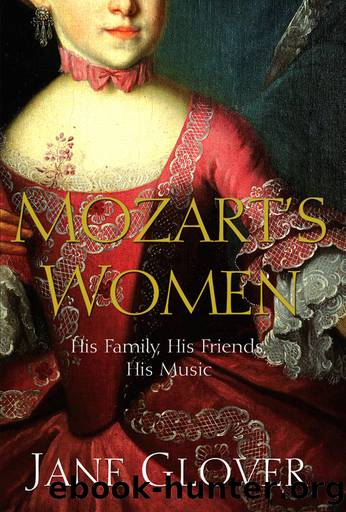Mozart's Women: His Family, His Friends, His Music by Jane Glover

Author:Jane Glover [Glover, Jane]
Language: eng
Format: epub
Tags: music, Individual Composer & Musician, Biography & Autobiography, Historical
ISBN: 9780330470506
Google: QBsWbKoAlVMC
Publisher: Pan Macmillan
Published: 2013-04-18T00:23:02.029523+00:00
IF INDEED IT was a spirit of happy confidence in Mozart, supported as he was by the loving warmth of all his Munich friends, which propelled him into taking such monumental steps into operatic maturity with Idomeneo, it was an altogether different environment which was to challenge him in Vienna. A far cry from the almost cosy, family-oriented artistic milieu of Munich, that of the Austrian capital was a cut-throat world of competition, self-promoting intrigue and machination, and huge individual egos. Dominated by, but by no means limited to, activities at Court, Viennese music-making involved a large assembly of personalities, tightly contesting and jealously guarding their territories. Political manoeuvre, and the corruptions habitually associated with power, were rife and effective.
The central figure in all this was the Italian wunderkind, Antonio Salieri, who, only six years older than Mozart, had at the age of twenty-four (in 1774) been appointed as Composer at Court, and also as Director of Opera. Later, in 1788, he would succeed Giuseppe Bonno in the illustrious position of Kapellmeister. For the rest of Mozartâs life these two composers would dance around each other in a complex relationship: Salieri did seem to block the path of his new rival, and possibly also to stir up cabals against him. But superficially at least they remained on the most courteous of terms; and beyond all the suspicion and mistrust there was unquestionably mutual respect, and, in the long run, affection too. And when in the spring of 1781 Mozart came to Vienna from Munich, he was unperturbed as he met head-on the challenges of this wholly different environment. For he was young, energetic, very noticeable, and above all extremely able; and there were abundant opportunities to be seized.
As the unfinished Zaïde had perhaps shown, Mozart had long had in his sights Joseph IIâs German National Theatre company at the Burgtheater. Since 1776, when this former real-tennis court and later home of French opéra-comique and Italian opera seria had come under the direct control of the Court, it had presented that thoroughly German theatrical art-form, singspiel, or comic opera in German with spoken dialogue. When Mozart arrived in Vienna, the director of the German National Theatre was Gottlieb Stephanie; and it was he who commissioned Mozart to write Die Entführung aus dem Serail, to his own adaptation of Bretznerâs play. With both Zaïde and Idomeneo, Mozart had made significant contributions to the work of the librettist, exercising in collaboration first with Schachtner and then with Varesco his own supreme musico-theatrical instincts, and helping therefore to fashion a text that best served the musical and emotional development of the drama. Here in Vienna, he took this collaboration one step further, working literally beside Stephanie to set the musical structure and enable real development of character. And he found this process intensely satisfying. He wrote to Leopold, â[Stephanie] is arranging the libretto for me â just as I want it, in fact â to a hair.â35 Mozart the musician and Mozart the dramatist were from now on inseparable.
Download
This site does not store any files on its server. We only index and link to content provided by other sites. Please contact the content providers to delete copyright contents if any and email us, we'll remove relevant links or contents immediately.
Kathy Andrews Collection by Kathy Andrews(11795)
The remains of the day by Kazuo Ishiguro(8949)
Spare by Prince Harry The Duke of Sussex(5165)
Paper Towns by Green John(5163)
The Body: A Guide for Occupants by Bill Bryson(5065)
Industrial Automation from Scratch: A hands-on guide to using sensors, actuators, PLCs, HMIs, and SCADA to automate industrial processes by Olushola Akande(5038)
Machine Learning at Scale with H2O by Gregory Keys | David Whiting(4280)
Be in a Treehouse by Pete Nelson(4017)
Never by Ken Follett(3917)
Harry Potter and the Goblet Of Fire by J.K. Rowling(3834)
Goodbye Paradise(3790)
The Remains of the Day by Kazuo Ishiguro(3377)
Into Thin Air by Jon Krakauer(3369)
Fairy Tale by Stephen King(3352)
The Cellar by Natasha Preston(3316)
The Genius of Japanese Carpentry by Azby Brown(3277)
120 Days of Sodom by Marquis de Sade(3245)
Reminders of Him: A Novel by Colleen Hoover(3062)
Drawing Shortcuts: Developing Quick Drawing Skills Using Today's Technology by Leggitt Jim(3057)
